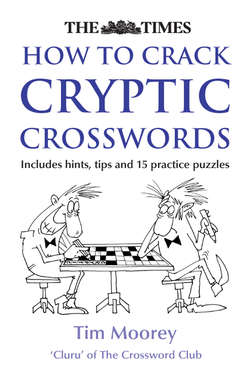Читать книгу The Times How to Crack Cryptic Crosswords - Tim Moorey - Страница 7
PART 1: CROSSWORD BASICS 1: Terminology
Оглавление‘She had another look at The Times Crossword. The clues might as well have been written in a foreign language.’
Simon Brett, The Stabbing in the Stables
The first three chapters establish the terms used throughout. They are essential reading for beginners, and perhaps also for some seasoned solvers who may have become used to different terminology.
What is a cryptic clue?
A cryptic clue is a sentence or phrase, involving a degree of deception, making sense and frequently conjuring an image, or triggering thoughts, in its surface reading, but when read in another way can be decoded using a limited number of well-established techniques to give a solution. Thus ‘cryptic’ is used in its meaning of hidden or misleading.
These are the other terms we shall use:
• Answers to clues, running across and down are entered into a grid, popularly a diagram, which has across and down empty squares to be filled.
• The grids in the case of the puzzles we are considering here contain black square blocks, hence they are seen in blocked puzzles.
• The other main type not being considered here has a grid with bars rather than blocks, hence the term barred puzzles.
• Clue answers are variously called solutions, entries and indeed answers.
• Where a solution letter, or letters, is able to be confirmed by intersecting entries, they are checked letters. Unchecked letters (unches in the trade) are therefore the opposite: the solver has no second way of confirming them.
• The person responsible for the crossword is a setter; more commonly, but in a term less attractive to most crossword professionals, a compiler.
• The term constructor, which suits puzzles with difficult- to-build grids, is used in North America.
• Other terms associated with clues such as wordplay, anagram, indicator and anagram fodder are explained as we meet them.
For completeness, there is a rarely used crossword term – light – whose meaning has fluctuated somewhat from the early days of crosswords but is defined by the Collins English Dictionary today as the solution to a clue.
ARE CRYPTICS EXCLUSIVELY BRITISH?
Commonwealth countries such as Canada, Australia, New Zealand, India, Kenya, Malta and South Africa have daily cryptics similar to British ones, as does Ireland. US crosswords are different in that grids are more open and clues are mildly cryptic or straightforward definitions. There are some occasional British-style puzzles in the New York Times and elsewhere. Nonetheless the UK can be considered the home of cryptics. For example, Daily Telegraph crosswords are syndicated to around 20 countries.
